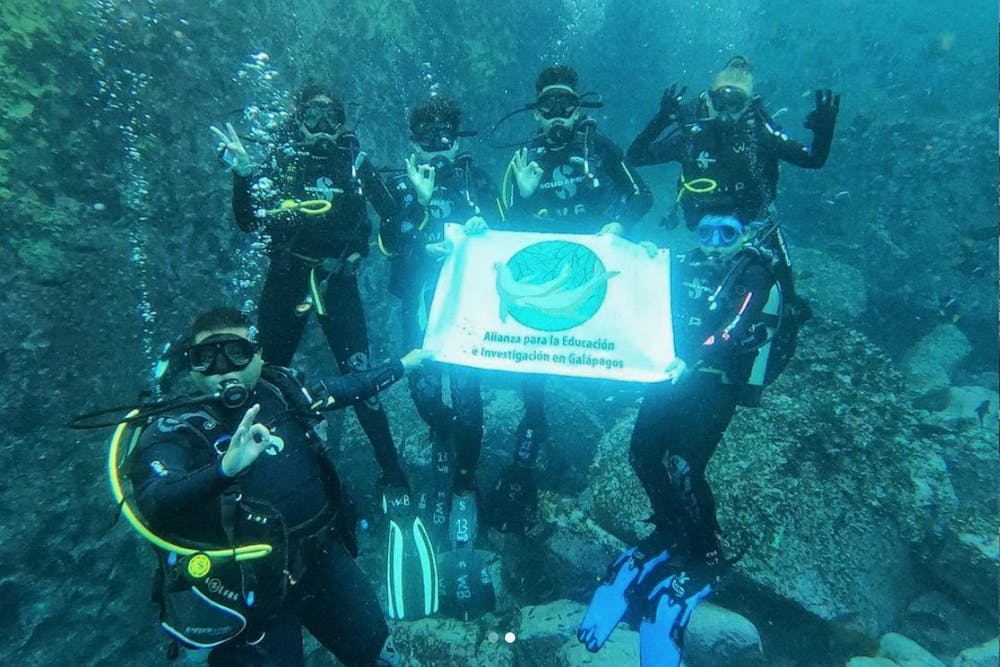
A team of Penn students, headed by Michael Weisberg, Chair of Philosophy and Co-Director of the Galápagos Education and Research Alliance, went to the Galápagos Islands to work on their respective science projects this summer. (Photo from Perry World House)
This summer, Michael Weisberg, Chair of Philosophy and Co-Director of the Galápagos Education and Research Alliance (GERA), took a team of Penn students to the Galápagos Islands to work on science projects in partnership with local Galápagos community members.
Some of the research projects included teaching local students how to scuba dive, working with government officials to adopt more robust water quality testing, and mapping trails through the islands' national parks. Weisberg and his team took advantage of the 12 hours of daylight that the Galápagos Islands – located on both sides of the Equator – receive, starting their days at sunrise and working until 10 at night, Weisberg said.
The Penn team consisted of two graduate students, one postdoctoral fellow, Lab Manager Maddie Tilyou, Research Assistant Olivia Fielding, and Weisberg. They were accompanied by one researcher from Villanova University and one local from the Galápagos. The team was in the Galápagos for roughly 10 days with some members staying for another couple of weeks.
GERA, a research alliance "primarily between Penn and the local community in the Galápagos," attempts to address environmental issues facing the Galápagos by involving locals in the project development process, Weisberg said.
"The only way to balance growth and conservation is to work in concert with communities like this one," reads a statement on the GERA website.
For example, one of Weisberg's latest projects involved teaching local middle and high school students scientific scuba diving techniques. Weisberg and his team worked with students to research dive protocols and foster a greater understanding of the ocean ecosystem. At the end of the program, some of the local students earned diving certifications.
In addition to teaching students how to dive, Weisberg and his team advocated for the creation of mobile polymerase chain reaction – PCR – labs to test the quality of water. PCR labs use DNA technology to detect mold and bacteria, Weisberg said. Along with the creation of labs, some members of the group engaged with government officials and small business owners to discuss water quality.
The team also worked with National Park rangers to improve trail assessment and mapping. They would follow National Park rangers throughout the islands' national parks to help create maps of the wilderness.
Weisberg said that he strives to bring an interdisciplinary approach to his work in the Galápagos, and in doing so makes an effort to recruit students from the School of Arts and Sciences, Nursing, the School of Design, and Wharton to join him in his research efforts.
In recent years, several other universities have joined GERA, including Villanova, Virginia Tech, and the University of Cincinnati.
Because of the COVID-19 pandemic, Weisberg and his team were previously unable to the Galápagos Islands in person, with their last international trip taking place in January of 2020.
Reflecting on the latest trip, Weisberg remarked on the beauty of the Galápagos wildlife. Some of his most vivid memories, he said, are of sea lions swimming in the water surrounding him and of blue-footed boobies diving into the water to catch fish.
“[I wish I] was a poet so I could describe it,” Weisberg said.
The Daily Pennsylvanian is an independent, student-run newspaper. Please consider making a donation to support the coverage that shapes the University. Your generosity ensures a future of strong journalism at Penn.
Donate







